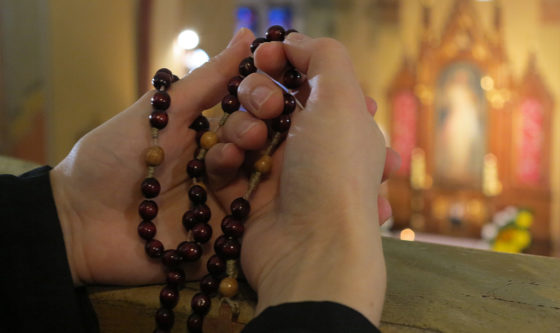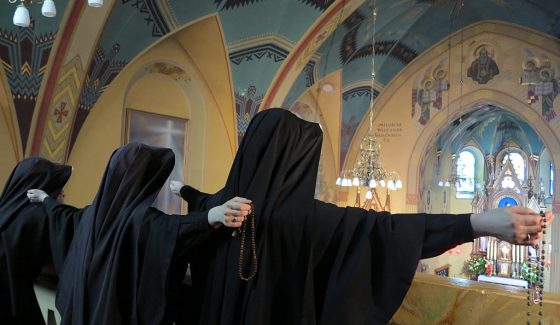Chaplet of the Divine Mercy
(for recitation on ordinary rosary beads)
Begin with:
Our Father, who art in heaven, hallowed be Thy name; Thy kingdom come; Thy will be done on earth as it is in heaven. Give us this day our daily bread; and forgive us our trespasses as we forgive those who trespass against us; and lead us not into temptation, but deliver us from evil. Amen.
Hail Mary, full of grace, the Lord is with thee; blessed art thou among women, and blessed is the fruit of thy womb, Jesus. Holy Mary, Mother of God, pray for us sinners, now and at the hour of our death. Amen.
I believe in God, the Father Almighty, Creator of heaven and earth; and in Jesus Christ, His only Son, our Lord; who was conceived by the Holy Spirit, born of the Virgin Mary, suffered under Pontius Pilate, was crucified, died, and was buried. He descended into hell; the third day He arose again from the dead; He ascended into heaven, sits at the right hand of God, the Father Almighty; from thence He shall come to judge the living and the dead. I believe in the Holy Spirit, the Holy Catholic Church, the communion of saints, the forgiveness of sins, the resurrection of the body, and life everlasting. Amen.
On the five large beads:
Eternal Father, I offer You the Body and Blood,
Soul and Divinity of Your dearly beloved Son, Our Lord Jesus Christ,
in atonement for our sins and those of the whole world.
On the ten small beads:
For the sake of His sorrowful Passion,
have mercy on us and on the whole world.
Conclude with (3 times):
Holy God, Holy Mighty One, Holy Immortal One,
have mercy on us and on the whole world.
____________________________
Imprimatur: Franciszek Cardinal Macharski
Cracow, August 1, 1994
Origins and correctness

This prayer is God’s special gift for our times. The Lord Jesus dictated it to Sister Faustina in Vilnius on the 13-14th September, 1935. On Friday, the 13th September, in her cell Sister Faustina had a vision of an angel who came to the earth to punish it for its sins. When she saw that sign of divine wrath, she began to implore the angel to hold off for a few moments and the world would do penance. However, when she stood before the majesty of the Holy Trinity, she did not dare to repeat that entreaty. Only when she felt the power of Jesus’ grace in her soul did she start to pray – she said the words heard interiorly. In the ‘Diary’ she wrote: “As I prayed thus, I saw the powerlessness of the angel, and he could not carry out the just punishment that sin deserved” (Diary 475).
The next day, when she entered the chapel, once again the Lord Jesus told her how the prayer, which we call the Chaplet to the Divine Mercy, should be said. “First, say one Our Father, one Hail Mary, and the Apostles’ Creed; next, on the Our Father beads you will say «Eternal Father, I offer You the Body and Blood, Soul and Divinity of Your Dearly Beloved Son, Our Lord, Jesus Christ, in atonement for our sins and those of the whole world;» and on the Hail Mary beads you will say these words, «For the sake of His sorrowful Passion, have mercy on us and on the whole world.» At the end, you will say these words three times, «Holy God, Holy Mighty One, Holy Immortal One, have mercy on us and on the whole world»” (Diary 476).
This formula of the prayer is to be said individually and in community. The Rev. Professor Ignacy Różycki wrote: “Anyone who changes the plural into singular: ‘our sins’ into: ‘my sins’; ‘have mercy on us’ into: ‘have mercy on me’ when saying the prayer individually – changes it against Jesus’ will and what he says is not the Chaplet to the Divine Mercy any more because ‘us’ in the prayer denotes the one who says it and all who he prays for especially, whereas ‘the whole world’ means: all others, both those who live and those who have died. In this manner, by demanding that the person saying the Chaplet entreat for mercy ‘on us’ and not ‘on me’, Jesus combats egoism in prayer and makes the Chaplet to the Divine Mercy an act of sacrificial love”. As regards the content of the Chaplet to the Divine Mercy, not only the number must not be altered but also the text should not be changed at all – by adding or removing any word.
However, in practice, there are many mistakes when the prayer is popularized and said. Most frequently, various words or sentences are added, for instance: “have mercy on us, on the Holy Father, on … and on the whole world or for the sake of His sorrowful Passion, for the seven sorrows of the Mother of God, have mercy…” or: “Glory be to the Father…” after I Believe In God. Sometimes the Chaplet, which was dictated by the Lord Jesus, is said without certain words, for instance at the end: “… and on the whole world” is omitted – only the rest of the Supplication formula is said. All alternations, words added to or not included in the wording of the Chaplet to the Divine Mercy change its meaning and, as a result, we say a different prayer, not the one dictated by the Lord Jesus. The prayer should not be said the way the rosary is said either: the decades should not be interspersed with meditations, intentions or any other texts. Intentions or texts which are to be meditated upon should be at the beginning – before the text of the Chaplet to the Divine Mercy, so that the entire prayer is said the way Jesus dictated it. In the Chaplet to the Divine Mercy formula only the following words can be transposed: świata całego can be changed into całego świata [the whole world – in Polish] – it does not alter the meaning and is more correct as regards Polish syntax. This wording of the Chaplet has received the imprimatur of the Church.
Theological meaning
The Chaplet to the Divine Mercy is extremely rich, therefore, it is worth reflecting upon the meaning of its individual words and expressions. The entire prayer is directed to God the Father, whom we offer His dearly beloved Son in atonement for our sins and those of the whole world and, for the sake of His sorrowful Passion, we implore the Divine Mercy on us and on the whole world. By saying this prayer we share in the common priesthood of Christ, offering God the Father His dearly beloved Son in atonement for our sins and those of the whole world.
The meaning of the Chaplet was a subject of a theological disputation which pertained to the correctness and, consequently, to the supernatural origins of the prayer. A former vice-chancellor of the Catholic University of Lublin, Rev. Wincenty Granat, claimed that there were theological errors in the Chaplet to the Divine Mercy, therefore, it could not come from God. During a conference on the Divine Mercy he presented a paper in which he wrote: “In the above-mentioned prayer there are important theological errors: firstly, the Son’s Divinity is the same as the one of God the Father, therefore, it cannot be offered to the Eternal Father; secondly, it is forbidden to make any offering of Divinity; thirdly, Divinity cannot be atonement for sins because Divinity – God to be precise – forgives sins, however, He is not an offering of atonement; it is the Saviour in human nature who is atonement for our sins”.
The Rev. Professor Ignacy Różycki clarified this contentious issue saying that the meaning of the formula: “the Body and Blood, Soul and Divinity of (…) Our Lord Jesus Christ’ had to be considered as a whole; the word Divinity itself cannot be taken out of context. “It is only in context – wrote Rev. Różycki – that one can find (…) the key [to the correct interpretation of the words], which is required by the basic rule of any criticism. Therefore, the rules of scientific interpretation would be seriously violated, the meaning which Jesus wanted the formula to have would be ‘brutally’ falsified and there would be a theological absurdity if – out of contextthe word ‘Divinity’ was explained as ‘divine nature’, for it is clear that Jesus Christ’s divine nature and the Father’s nature are identical, therefore, Jesus’ divine nature cannot be offered to the Father.”
It was not in the Chaplet to the Divine Mercy that the formula – the subject of the dispute – was used for the first time – it had been used in the Church in the Eucharistic and Christological context for quite some time already. As Rev. Różycki notes: “the dogmatic definition of the presence of the entire Jesus in the Eucharist, expressed by the Council of Trent, is the most important and the most solemn Eucharistic context. According to this definition, ‘Divinity’ does not denote the Divine nature, which is common to the three Persons but, directly, in other words: precisely, it refers to the Divine Person of Jesus”. The same phrase, in the Eucharistic context, is part of a prayer which an angel dictated to the children in Fatima in 1916. Thus, when we say the Chaplet to the Divine Mercy we offer God not only Jesus’ Divinity, but His entire Person, that is, both His Divine Personality and His entire Humanity, which consists of the body, blood and soul.
However, a question can come up: may the entire person of the Son of God Incarnate be offered to God? Here Rev. I. Różycki’s answer is also positive. He makes reference to Saint Paul’s letter to the Ephesians, in which it is written that while fulfilling His mission, Christ Himself was the first one who “gave Himself up in our place as a (…) sacrifice to God (Eph 5:2). According to this text by Saint Paul – writes Rev. Różycki – the entire Christ, that is, His entire humanity as well as His Divine Person was offered by Christ to God’. Therefore, when we say these words of the Chaplet we unite ourselves with Jesus’ sacrifice which He made on the Cross for our salvation. By saying the words: Your dearly beloved Son we refer to God’s love for the Son and, in Him, for all people. As Rev. Różycki writes: “we use the strongest possible argument requesting God to hear us”.
By saying the Chaplet we ask for mercy “for us and for the whole world”. The pronoun us, denotes here the person who says the chaplet as well as all those for who he wishes and is obliged to pray, whereas the expression “the whole world”, refers to all the people who live in the world as well as souls suffering in purgatory. Thus, when we say the text of the Chaplet to the Divine mercy – unchanged – we perform an act of mercy towards neighbours, which is a precondition for obtaining God’s mercy.
Promises
The Lord Jesus attached great promises to this prayer provided that the conditions of the correct devotion to the Divine Mercy are met, that is, the spirit of trusting God and being merciful towards neighbour is required. Perseverance in praying is an expression of this trust; the greater the trust is, the greater the perseverance in saying the Chaplet is. The Lord Jesus said to Sister Faustina that by saying the Chaplet one can obtain everything. However, apart from the grace of a good death, He has never claimed that everything can be obtained immediately, having said the prayer once. In her ‘Diary’ Sister Faustina describes situations, for instance, calming of a storm (Diary 1731), when her request had been granted after she had said the Chaplet once. She also writes about situations when she had been saying this prayer without interruption for many hours, for example, praying for rain (Diary 1128). When she prayed by the bedside of the dying, sometimes it was enough when she said the Chaplet once in order to obtain the grace of a happy and peaceful death and some other time, when a soul needed a lot of prayer, it was necessary for her to say the Chaplet many times (Diary 1035).
The Lord Jesus attached a promise of obtaining all graces to the Chaplet to the Divine Mercy said with trust – He said: “When they say this Chaplet, it will please Me to grant everything they shall ask for” (Diary 1541), adding: “provided it is in compliance with My will” (Diary 1731). God’s will is an expression of His love for man, thus everything that is not compatible with it is either bad or harmful. Therefore, it cannot be given by the best Father, who desires only man’s good – from the perspective of eternity. This general promise pertains not only to supernatural graces but also to rewards in this world.
Apart from the general promise, there are promises that concern the hour of death, and to be more precise: the grace of a happy and peaceful death, in other words, death in the state of grace and without experiencing fear and terror. These graces can be obtained not only by those who say the Chaplet with trust themselves but also the dying by whose bedside others will say this prayer. The Lord Jesus promised: “I shall treat every soul that says this Chaplet as My glory, and I shall grant it My defence at the hour of death; also those at whose deathbed others say the Chaplet shall be granted the same indulgence. When people say the Chaplet at a dying person’s bedside, God’s anger is placated, and unfathomed mercy embraces the soul” (Diary 811). The Lord Jesus promises to grant the grace of a good death, that is, of conversion and remission of sins, even if the whole Chaplet has been said once – it needs to be said in the spirit of the Divine Mercy devotion, thus, the attitude of trusting God (faith, hope, love, humility, sincere and deep contrition) and being merciful towards neighbour is required. He said: “Anyone who says the Chaplet just once, even should he be the most hardened of sinners, shall receive grace from My infinite mercy” (Diary 687).
What the Lord Jesus said to Sister Faustina shows how great the graces attached to this prayer are: “By saying the Chaplet you are bringing mankind closer to Me” (Diary 929). Priests are to recommend it to sinners as their last hope of salvation (cf. Diary 687).
Sr M. Elisabeth Siepak ISMM
Full theological analysis in:
Rev. Ignacy Różycki: “The Devotion to the Divine Mercy”, Cracow 2008, pp 105-115.
_________________________
See also: Mercy » History of the Devotion to the Divine Mercy » Chaplet of the Divine Mercy
Translated by Iwona Franceschini
















